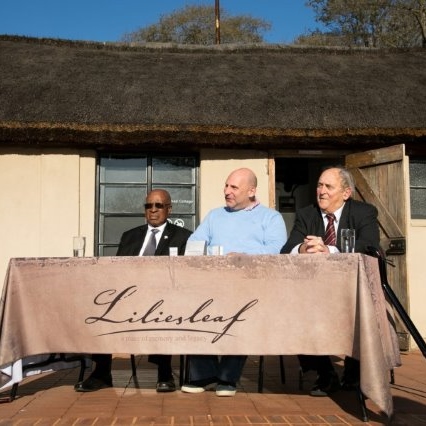SA
Nicholas Wolpe being honoured like royalty
When a South African CEO is honoured with an award that is normally reserved for foreign heads of state and royalty, there is a good reason to find out why.

NICOLA MILTZ
Nicholas Wolpe, the founder and CEO of the Liliesleaf Trust, has been awarded with a Knighthood by the King of Sweden in recognition for his unwavering commitment to keeping the memory of the struggle against apartheid alive.
Wolpe was only a tiny baby when police raided Liliesleaf Farm in Rivonia, Johannesburg on July 11, 1963 arresting the high command of Umkhonto we Sizwe. His father, Harold, was one of those.
The arrests led to the famous Rivonia Trial at which eight accused, including Nelson Mandela, Walter Sisulu, Govan Mbeki, Ahmed Kathrada, Denis Goldberg, Elias Motsoaledi, Andrew Mlangeni and Raymond Mhlaba, were sentenced to life imprisonment.
Wolpe’s parents, Harold and AnnMarie, fled into exile shortly after Harold escaped from the Marshall Square police headquarters in Johannesburg by bribing a young warder, just before the start of the Rivonia Trial. Nicholas returned to South Africa as a young man on a mission to bring those defining moments in the history of South Africa to life.
He went back to Liliesleaf Farm and created a centre of memory.
This week Wolpe told the SA Jewish Report he was “shocked, surprised and somewhat dumbfounded” when the Swedish Ambassador, Cecilia Julin informed him that the King of Sweden, Carl XVI Gustaf, had bestowed upon him a Kinghthood of the First Class of the Royal Order of the Polar Star – awarded to those who have “displayed a civic merit for devotion to duty, for the science, literary, learned and useful works and for new and beneficial works”.
“It took me completely by surprise and came out of the blue… I never dreamed it would ever happen to me,” he said.
“It is a great honour and privilege to receive a knighthood… it is an acknowledgement and recognition of my commitment and dedication to ensuring that a unique and seminal epoch in our struggle for freedom is not lost and forgotten, but remembered and honoured.”
He said it gave him a “deep sense of satisfaction” that his life’s work had been has been recognised as worthwhile.
“That people appreciate what I have been striving to achieve and accomplish through Liliesleaf and the Liliesleaf Legacy Project… fills me with a sense of pride, joy and elation,” he said.
It has not always been easy for Wolpe to achieve his goal of preserving the memory of a specific moment during the struggle.
“There have been times when I have been consumed with the dread that the work… has fallen on deaf ears and has been done in vain, that there exists an indifference to preserving the memory of our struggle.”
However, he said this award had given him “renewed hope” that it had been worth it, and that it still had relevance and meaning.”
When asked what the award would mean to his father, he said that although Harold Wolpe did not “seek the limelight” it would go a long way to recognising the role he played in the struggle for freedom.
“I feel he never received the due recognition of his commitment… contribution towards bringing about a free, democratic, just and non-sexist and non-racial society for all, which he deserved… a part of me feels that this knighthood is also honouring and recognising his contribution… I am sure he would be immensely proud.”
And of course, to the others arrested in July 1963 at Liliesleaf Farm.
He said this was also for the men who sacrificed their own lives so that the South Africans of today could enjoy the “fruits of freedom”.
“This is not just about me, but is also an honour and recognition to the memory of a unique, ethical and principled group of leaders who rose above self-interest, wants and aspirations.”
Liliesleaf and places like it, continue to be of major significance to South Africans, he said.
“South Africa stands at a cross roads, at a defining moment of reckoning, where we are grappling with the cancerous encroachment of corruption, self-interest and state capture – the very antithesis of the ideals, principles, beliefs and aspirations of the Struggle heroes.
“As we struggle to roll back the tide of self-interest and wanton material accumulation… Liliesleaf and what it symbolises… stands as a reminder to the youth of the importance of what underpinned our Struggle and what can be achieved through a unified commitment defined and underpinned by self-dedication.
“As a site of memory, Liliesleaf keeps the history of a significant and seminal period in our liberation struggle alive and in the consciousness of all. For it is our link to the past, our connection to the present and our bridge to our future.”
Liliesleaf has a crucial and indispensable role to play in highlighting that the Freedom Charter is not merely a statement, but a statement of intent, a reality as highlighted by the role individuals across the colour bar played in the liberation struggle and fight for freedom, justice, equality and democracy.